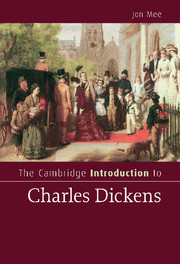Book contents
- Frontmatter
- Contents
- List of illustrations
- Preface
- Chronology
- List of abbreviations
- 1 Dickens the entertainer: ‘People must be amuthed’
- 2 Dickens and language: ‘What I meantersay’
- 3 Dickens and the city: ‘Animate London … inanimate London’
- 4 Dickens, gender, and domesticity: ‘Be it ever … so ghastly … there's no place like it’
- 5 Adapting Dickens: ‘He do the police in different voices’
- Afterword: Dickens's world
- Notes
- Further reading
- Index
- Cambridge Introductions to …
5 - Adapting Dickens: ‘He do the police in different voices’
Published online by Cambridge University Press: 05 August 2012
- Frontmatter
- Contents
- List of illustrations
- Preface
- Chronology
- List of abbreviations
- 1 Dickens the entertainer: ‘People must be amuthed’
- 2 Dickens and language: ‘What I meantersay’
- 3 Dickens and the city: ‘Animate London … inanimate London’
- 4 Dickens, gender, and domesticity: ‘Be it ever … so ghastly … there's no place like it’
- 5 Adapting Dickens: ‘He do the police in different voices’
- Afterword: Dickens's world
- Notes
- Further reading
- Index
- Cambridge Introductions to …
Summary
From very early on in his literary career Dickens found his writing picked up and adapted for other purposes, not least because of the tremendous selling power of his name. G. M. W. Reynolds, to become the most widely read novelist in Victorian England in the 1840s and 1850s, set off on his career with the serialized Pickwick Abroad (1839), which took Dickens's character across to the Continent. The newspaper publisher Edward Lloyd had his first success in 1837 with his Penny Pickwick. Sometimes Dickens gave his permission for these adaptations of his texts, but often he was annoyed. Later he was to adapt his own work for public reading. Apart from straightforward adaptation, his writing has also influenced a great deal of other literature, appearing there either indirectly via allusions to his novels, such as those in T. S. Eliot's The Waste Land (1922) and James Joyce's Ulysses (1922), or more directly when writers pick up and redevelop his characters and their back stories in so called ‘hi-jack novels’, as Peter Carey did with his Jack Maggs (1999), written from the point of view of Magwitch with an emphasis on the violence and exploitation of the imperial city. Between these two forms of literary adaptation, we might add a third, where Dickens-as-literature appears in the story: this category would include Evelyn Waugh's A Handful of Dust (1934) and Lloyd Jones's Mister Pip (2008), both of which involve characters reading Dickens in a tropical jungle.
- Type
- Chapter
- Information
- The Cambridge Introduction to Charles Dickens , pp. 84 - 98Publisher: Cambridge University PressPrint publication year: 2010



